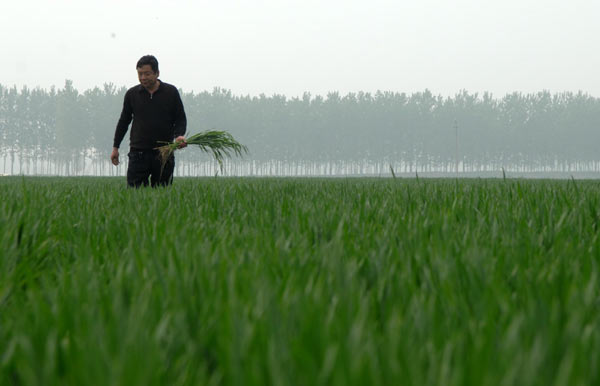 |
|
|
|
|||||||||||
BEIJING - Agricultural experts and economists are deeply concerned over future agricultural development in China despite a report predicting on Wednesday that the nation's grain output will rise for the ninth consecutive year in 2012.
 |
|
A farmer works at a wheat feild in Ludong village of Yuanyang county, Zhengzhou city, Central China's Henan province on April 17, 2012. [Photo/Xinhua] |
The Chinese Academy of Social Sciences (CASS) on Wednesday made the prediction based on continued increases in grain prices in recent years and the government's enhanced efforts to offer farmers subsidies for raising grain crops.
A green paper on rural China released by the CASS forecast the country's grain output this year may exceed 580 million tonnes, compared to an output of 571.21 million tonnes in 2011, which grew 4.5 percent year-on-year and marked the eighth consecutive annual rise.
However, despite the positive forecast, experts attending the release of the paper said they were worried about the status quo of the country's agriculture, which is at present based on scattered household farming and is loosely organized.
"The sector's development is currently a weak spot compared to the nation's [fast] industrialization and urbanization processes," said Fan Jianping, chief economist of the State Information Center.
"Moreover, the problem of labor has become more acute in recent years as cities are competing to attract more work forces from agriculture in the rural regions," Fan added.
The economist pointed out this phenomenon is easily observable in many rural areas. "The villages are now left with only aged people and dogs... many farmlands are abandoned," he noted while talking of a recent trip he made to southwestern Sichuan province.
Guo Wei, a professor on economic development in rural regions, said that despite China's bumpy harvests in past years, the country is actually facing a tight supply of farm produce, and the situation is even worsening because the nation's deficit in grain trade is continually rising.
"Furthermore, supply pressure will increase as continued rises in grain output in the coming years will be much harder," Guo said.
Zhu Gang, a researcher with the Rural Development Institute under the CASS, who also participated in the green paper project, said corn may top rice as China's major grain product this year, as industrial and feed demands for corn are high.
Zhu noted that rising prices of production materials and the likelihood of more severe impacts from natural disasters this year would remain the two challenges that could threaten grain output.
"The long-term development of China's agricultural industry cannot be disconnected to the support of modern finance, logistics and technology. These elements must too be transplanted to agriculture so that the primary industry may expect another great leap," said Fan Jianping.
He also noted that sharp and more frequent fluctuations in farm produce prices in recent years have even disturbed the stability of the national economy, because the foundation of agriculture is too weak.
Fan urged greater reform of household-based farming. He did not elaborate on the specifics of how, even though he stressed a young labor force in the agricultural sector will be highly important as social aging becomes a bigger problem in the world's most populous country.
To boost farmers' enthusiasm, a government work report delivered by Premier Wen Jiabao in March this year said efforts will be made to increase farmers' income, support the development of agricultural technology, build rural infrastructure and protect farm land this year.
It said that the central fiscal authorities plan to allocate 1.23 trillion yuan for agriculture, rural areas and farmers, 186.8 billion yuan more than last year.

|

|

|

|

|

|